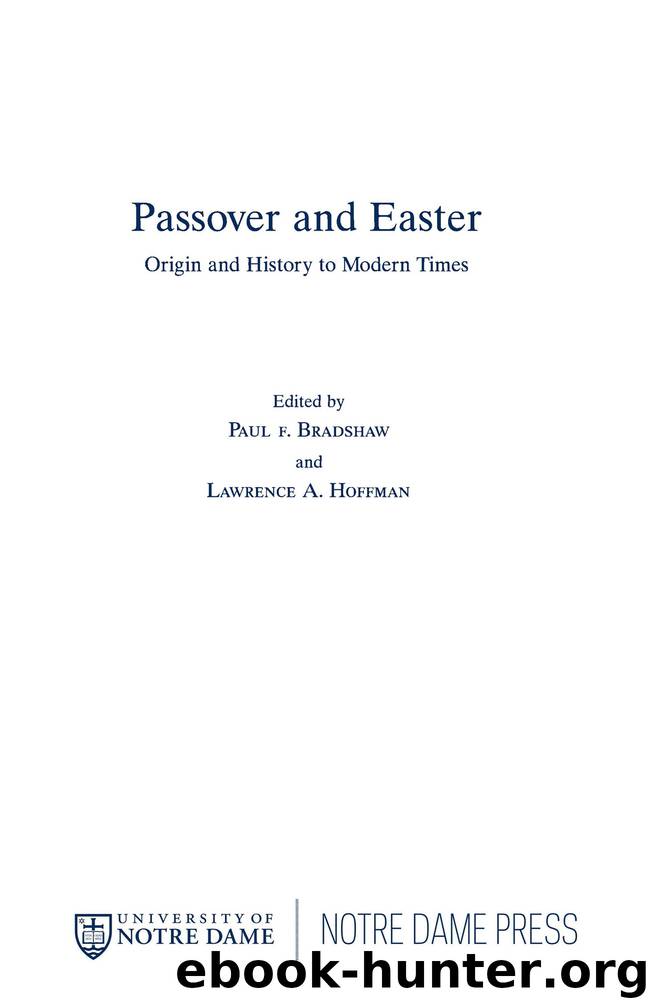Passover and Easter by Bradshaw Paul F.; Hoffman Lawrence A.; & Lawrence A. Hoffman

Author:Bradshaw, Paul F.; Hoffman, Lawrence A.; & Lawrence A. Hoffman
Language: eng
Format: epub
Publisher: University of Notre Dame Press
Published: 2016-03-05T16:00:00+00:00
PART 2
Medieval Developments
Passover in the Middle Ages
ISRAEL J. YUVAL
My earlier essay dealt with the similarity of the narratives that came to mark the Jewish Passover and the Christian Easter. Here I wish to compare their medieval ritual and symbolism. That early era had featured a relatively mutual give-and-take between the two, but by the eleventh or twelfth centuries, relationships had become totally one-sided. In the second and third centuries, Christians had been persecuted while Jews enjoyed the status of religio licita, whereas by the twelfth century, things were reversed: the church was now triumphant, and Jews were “serfs of the imperial chamber,” or indentured to the apostolic throne. Where, therefore, Passover and Easter customs display medieval similarities that do not hark back to antiquity, they reflect Christian influence upon Judaism, not the reverse.
Moreover, in the Middle Ages, the two holidays of Passover and Easter had become the focal point for displays of hatred and the occasion for libels against Jews. By the thirteenth century, it was not uncommon to find Jews charged with killing Christians to obtain their blood for Passover. But the real novelty of that century was a new charge: that Jews desecrated the host.1 I wish to clarify the ritual backdrop for that libel, without, however, denying the causal significance of the doctrine of transubstantiation. Behind the charge against the Jews was the need to extract the acquiescence of Christians who denied the miraculous change of essence in which they had difficulty believing. At the same time, the charge of host desecration is an extension of the blood libel, since it followed from the doctrine of transubstantiation that Jews no longer needed real flesh and blood Christians; they could simply stab the host.
I assume that Christians charged the Jews with murdering the host in part because they saw partial affirmation of that charge in Jewish ritual practice itself. We have here no mere theological diatribe but a dialogue in the language of ritual.
Download
This site does not store any files on its server. We only index and link to content provided by other sites. Please contact the content providers to delete copyright contents if any and email us, we'll remove relevant links or contents immediately.
| Christmas | Easter & Lent |
The 5 Love Languages: The Secret to Love That Lasts by Gary Chapman(8481)
The Space Between by Michelle L. Teichman(6080)
Assassin’s Fate by Robin Hobb(5229)
Wiseguy by Nicholas Pileggi(4582)
Everything Happens for a Reason by Kate Bowler(4062)
Gerald's Game by Stephen King(3913)
A Simplified Life by Emily Ley(3565)
The Power of Positive Thinking by Norman Vincent Peale(3443)
Pillow Thoughts by Courtney Peppernell(3383)
Resisting Happiness by Matthew Kelly(2882)
Girl, Wash Your Face by Rachel Hollis(2819)
Being Aware of Being Aware by Rupert Spira(2702)
Name Book, The: Over 10,000 Names--Their Meanings, Origins, and Spiritual Significance by Astoria Dorothy(2488)
Real Sex by Lauren F. Winner(2467)
More Language of Letting Go: 366 New Daily Meditations by Melody Beattie(2436)
The Holy Spirit by Billy Graham(2408)
Fast Facts on Defending Your Faith by John Ankerberg & John Weldon(2387)
Victory over the Darkness by Neil T. Anderson(2384)
The Secret Power of Speaking God's Word by Joyce Meyer(2248)
